formerly eScholarship Editions


|
|
|
|
Your search for
'Anthropology' in subject
found 300 book(s). | Modify Search | Displaying 261 - 280 of 300 book(s) | |
| 261. | 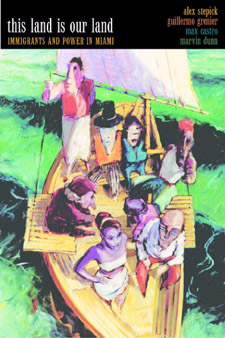 | Title: This land is our land: immigrants and power in Miami Author: Stepick, Alex Published: University of California Press, 2003 Subjects: American Studies | Anthropology | Ethnic Studies | Politics | Sociology | Urban Studies | Immigration Publisher's Description: For those opposed to immigration, Miami is a nightmare. Miami is the de facto capital of Latin America; it is a city where immigrants dominate, Spanish is ubiquitous, and Denny's is an ethnic restaurant. Are Miami's immigrants representative of a trend that is undermining American culture and identity? Drawing from in-depth fieldwork in the city and looking closely at recent events such as the Elián González case, This Land Is Our Land examines interactions between immigrants and established Americans in Miami to address fundamental questions of American identity and multiculturalism. Rather than focusing on questions of assimilation, as many other studies have, this book concentrates on interethnic relations to provide an entirely new perspective on the changes wrought by immigration in the United States. A balanced analysis of Miami's evolution over the last forty years, This Land Is Our Land is also a powerful demonstration that immigration in America is not simply an "us versus them" phenomenon. [brief] Similar Items |
| 262. | 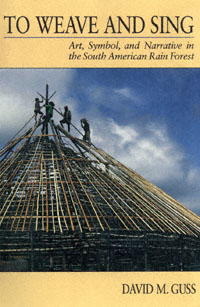 | Title: To weave and sing: art, symbol, and narrative in the South American rainforest Author: Guss, David M Published: University of California Press, 1990 Subjects: Anthropology | Cultural Anthropology | Art | Latin American Studies Publisher's Description: To Weave and Sing is the first in-depth analysis of the rich spiritual and artistic traditions of the Carib-speaking Yekuana Indians of Venezuela, who live in the dense rain forest of the upper Orinoco. Within their homeland of Ihuruna, the Yekuana have succeeded in maintaining the integrity and unity of their culture, resisting the devastating effects of acculturation that have befallen so many neighboring groups. Yet their success must be attributed to more than natural barriers of rapids and waterfalls, to more than lack of "contact" with our "modern" world. The ethnographic history recounted here includes not only the Spanish discovery of the Yekuana but detailed indigenous accounts of the entire history of Yekuana contact with Western culture, revealing an adaptive technique of mythopoesis by which the symbols of a new and hostile European ideology have been consistently defused through their incorporation into traditional indigenous structures.The author's initial point of departure is the Watunna , the Yekuana creation epic, but he finds his principal entrance into this mythic world through basketry, focusing on the eleborate kinetic designs of the round waja baskets and the stories told about them. Guss argues that the problem of understanding Yekuana basketry is the problem of understanding all traditional art forms within a tribal context, and critiques the cultural assumptions inherent in our systems of classification. He demonstrates that the symbols woven into the baskets function not in isolation but collectively, as a powerful system cutting across the entire culture. To Weave and Sing addresses all Yekuana material culture and the greater reality it both incorporates and masks, discerning a unifying configuration of symbols in chapters on architectural forms, the geography of the body, and the use of herbs, face paints, and chants. A narrow view of slash-and-burn gardens as places of mere subsistence is challenged by Guss's portrait of these exclusively female spaces as systematic inversions of the male world, "the sacred turned on its head." Throughout, a wealth of narrative and ritual materials provides us with the closest approximation we have to a native exegesis of these phenomena. What we are offered here is a new Poetics of Culture, ethnography not as a static given but as a series of shifting fields, wherein culture (and our image of it) is constantly recreated in all of its parts, by all of its members. [brief] Similar Items |
| 263. |  | Title: Total confinement: madness and reason in the maximum security prison Author: Rhodes, Lorna A. (Lorna Amarasingham) Published: University of California Press, 2004 Subjects: American Studies | Anthropology | Cultural Anthropology | Medical Anthropology | Ethnic Studies | Gender Studies | Medicine | Politics | Sociology Publisher's Description: In this rare firsthand account, Lorna Rhodes takes us into a hidden world that lies at the heart of the maximum security prison. Focusing on the "supermaximums" - and the mental health units that complement them - Rhodes conveys the internal contradictions of a system mandated to both punish and treat. Her often harrowing, sometimes poignant, exploration of maximum security confinement includes vivid testimony from prisoners and prison workers, describes routines and practices inside prison walls, and takes a hard look at the prison industry. More than an exposé, Total Confinement is a theoretically sophisticated meditation on what incarceration tells us about who we are as a society. Rhodes tackles difficult questions about the extreme conditions of confinement, the treatment of the mentally ill in prisons, and an ever-advancing technology of isolation and surveillance. Using her superb interview skills and powers of observation, she documents how prisoners, workers, and administrators all struggle to retain dignity and a sense of self within maximum security institutions. In settings that place in question the very humanity of those who live and work in them, Rhodes discovers complex interactions - from the violent to the tender - among prisoners and staff. Total Confinement offers an indispensable close-up of the implications of our dependence on prisons to solve long-standing problems of crime and injustice in the United States. [brief] Similar Items |
| 264. | 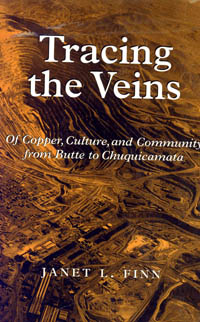 | Title: Tracing the veins: of copper, culture, and community from Butte to Chuquicamata Author: Finn, Janet L 1956- Published: University of California Press, 1998 Subjects: Anthropology | Cultural Anthropology | American Studies | California and the West | Economics and Business | Environmental Studies | Latino Studies Publisher's Description: This tale of two cities - Butte, Montana, and Chuquicamata, Chile - traces the relationship of capitalism and community across cultural, national, and geographic boundaries. Combining social history with ethnography, Janet Finn shows how the development of copper mining set in motion parallel processes involving distinctive constructions of community, class, and gender in the two widely separated but intimately related sites. While the rich veins of copper in the Rockies and the Andes flowed for the giant Anaconda Company, the miners and their families in both places struggled to make a life as well as a living for themselves.Miner's consumption, a popular name for silicosis, provides a powerful metaphor for the danger, wasting, and loss that penetrated mining life. Finn explores themes of privation and privilege, trust and betrayal, and offers a new model for community studies that links local culture and global capitalism. [brief] Similar Items |
| 265. | 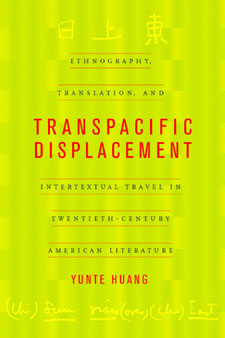 | Title: Transpacific displacement: ethnography, translation, and intertextual travel in twentieth-century American literature Author: Huang, Yunte Published: University of California Press, 2002 Subjects: Literature | Asian Literature | Comparative Literature | Poetry | Anthropology | Asian Studies | China Publisher's Description: Yunte Huang takes a most original "ethnographic" approach to more and less well-known American texts as he traces what he calls the transpacific displacement of cultural meanings through twentieth-century America's imaging of Asia. Informed by the politics of linguistic appropriation and disappropriation, <I>Transpacific Displacement </I>opens with a radically new reading of Imagism through the work of Ezra Pound and Amy Lowell. Huang relates Imagism to earlier linguistic ethnographies of Asia and to racist representations of Asians in American pop culture, such as the book and movie character Charlie Chan, then shows that Asian American writers subject both literary Orientalism and racial stereotyping to double ventriloquism and countermockery. Going on to offer a provocative critique of some textually and culturally homogenizing tendencies exemplified in Maxine Hong Kingston's work and its reception, Huang ends with a study of American translations of contemporary Chinese poetry, which he views as new ethnographies that maintain linguistic and cultural boundaries. [brief] Similar Items |
| 266. |  | Title: Tribes of India: the struggle for survival Author: Fürer-Haimendorf, Christoph von 1909- Published: University of California Press, 1982 Subjects: Anthropology | Asian Studies Similar Items |
| 267. | 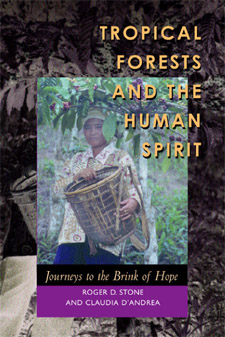 | Title: Tropical forests and the human spirit: journeys to the brink of hope Author: Stone, Roger D Published: University of California Press, 2002 Subjects: EcologyEvolutionEnvironment | Ecology | Conservation | Anthropology Publisher's Description: Tropical forests are vanishing at an alarming rate. This book, based on extensive international field research, highlights one solution for preserving this precious resource: empowering local people who depend on the forest for survival. Synthesizing a vast amount of information that has never been brought together in one place, Roger D. Stone and Claudia D'Andrea provide a clearly written and energizing tour of global efforts to empower community-based forest stewards. Along the way, they show the fundamental importance of tropical forest ecosystems and deepen our sense of urgency to save them for the benefit of billions of rural people in tropical and subtropical regions as well as for countless species of plants and animals. In their travels to research this book, the authors saw many remarkable examples of how proficient even the poorest local people can be in stabilizing and recovering formerly destitute forests. With engagingly written case studies from Thailand's Golden Triangle to Mindanao in the Philippines, from Indonesia, India, and Africa to Brazil, Mexico, and Central America, they introduce us to the communities and the individuals, the governments, the loggers, the agencies, and the local groups who vie for forest resources. Contrasting community-based efforts and traditional forest management with government and donor efforts, they discuss the many reasons why international institutions and national governments have been unable and unwilling to stem the accelerating loss of tropical forestland. This book argues we are paying a terrible price--politically, economically, and environmentally--for allowing tropical forests to be stripped. Community-based forestry is no panacea, but this book clearly shows its effectiveness as a management technique. [brief] Similar Items |
| 268. | 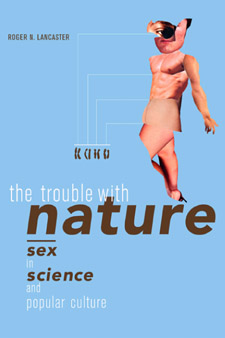 | Title: The trouble with nature: sex in science and popular culture Author: Lancaster, Roger N Published: University of California Press, 2003 Subjects: American Studies | Anthropology | Gender Studies | Popular Culture | GayLesbian and Bisexual Studies | Science | Sociology Publisher's Description: Roger N. Lancaster provides the definitive rebuttal of evolutionary just-so stories about men, women, and the nature of desire in this spirited exposé of the heterosexual fables that pervade popular culture, from prime-time sitcoms to scientific theories about the so-called gay gene. Lancaster links the recent resurgence of biological explanations for gender norms, sexual desires, and human nature in general with the current pitched battles over sexual politics. Ideas about a "hardwired" and immutable human nature are circulating at a pivotal moment in human history, he argues, one in which dramatic changes in gender roles and an unprecedented normalization of lesbian and gay relationships are challenging received notions and commonly held convictions on every front. The Trouble with Nature takes on major media sources - the New York Times, Newsweek - and widely ballyhooed scientific studies and ideas to show how journalists, scientists, and others invoke the rhetoric of science to support political positions in the absence of any real evidence. Lancaster also provides a novel and dramatic analysis of the social, historical, and political backdrop for changing discourses on "nature," including an incisive critique of the failures of queer theory to understand the social conflicts of the moment. By showing how reductivist explanations for sexual orientation lean on essentialist ideas about gender, Lancaster invites us to think more deeply and creatively about human acts and social relations. [brief] Similar Items |
| 269. | 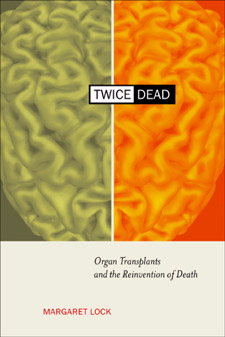 | Title: Twice dead: organ transplants and the reinvention of death Author: Lock, Margaret M Published: University of California Press, 2001 Subjects: Anthropology | Medical Anthropology | Cultural Anthropology | Ethics | Sociology | Sociology | Ethics | Sociology | Ethnic Studies | Ethnic Studies Publisher's Description: Tales about organ transplants appear in mythology and folk stories, and surface in documents from medieval times, but only during the past twenty years has medical knowledge and technology been sufficiently advanced for surgeons to perform thousands of transplants each year. In the majority of cases individuals diagnosed as "brain dead" are the source of the organs without which transplants could not take place. In this compelling and provocative examination, Margaret Lock traces the discourse over the past thirty years that contributed to the locating of a new criterion of death in the brain, and its routinization in clinical practice in North America. She compares this situation with that in Japan where, despite the availability of the necessary technology and expertise, brain death was legally recognized only in 1997, and then under limited and contested circumstances. Twice Dead explores the cultural, historical, political, and clinical reasons for the ready acceptance of the new criterion of death in North America and its rejection, until recently, in Japan, with the result that organ transplantation has been severely restricted in that country. This incisive and timely discussion demonstrates that death is not self-evident, that the space between life and death is historically and culturally constructed, fluid, multiple, and open to dispute. In addition to an analysis of that professional literature on and popular representations of the subject, Lock draws on extensive interviews conducted over ten years with physicians working in intensive care units, transplant surgeons, organ recipients, donor families, members of the general public in both Japan and North America, and political activists in Japan opposed to the recognition of brain death. By showing that death can never be understood merely as a biological event, and that cultural, medical, legal, and political dimensions are inevitably implicated in the invention of brain death, Twice Dead confronts one of the most troubling questions of our era. [brief] Similar Items |
| 270. | 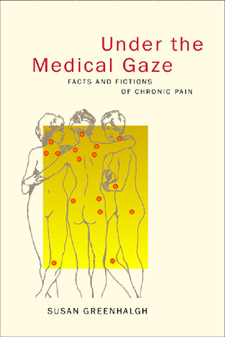 | Title: Under the medical gaze: facts and fictions of chronic pain Author: Greenhalgh, Susan Published: University of California Press, 2001 Subjects: Anthropology | Folklore and Mythology | Medical Anthropology | Physical Anthropology | Cultural Anthropology | Medicine | Gender Studies | Sociology | Social Problems | Social Problems Publisher's Description: This compelling account of the author's experience with a chronic pain disorder and subsequent interaction with the American health care system goes to the heart of the workings of power and culture in the biomedical domain. It is a medical whodunit full of mysterious misdiagnosis, subtle power plays, and shrewd detective work. Setting a new standard for the practice of autoethnography, Susan Greenhalgh presents a case study of her intense encounter with an enthusiastic young specialist who, through creative interpretation of the diagnostic criteria for a newly emerging chronic disease, became convinced she had a painful, essentially untreatable, lifelong muscle condition called fibromyalgia. Greenhalgh traces the ruinous effects of this diagnosis on her inner world, bodily health, and overall well-being. Under the Medical Gaze serves as a powerful illustration of medicine's power to create and inflict suffering, to define disease and the self, and to manage relationships and lives. Greenhalgh ultimately learns that she had been misdiagnosed and begins the long process of undoing the physical and emotional damage brought about by her nearly catastrophic treatment. In considering how things could go so awry, she embarks on a cogent and powerful analysis of the sociopolitical sources of pain through feminist, cultural, and political understandings of the nature of medical discourse and practice in the United States. She develops fresh arguments about the power of medicine to medicalize our selves and lives, the seductions of medical science, and the deep, psychologically rooted difficulties women patients face in interactions with male physicians. In the end, Under the Medical Gaze goes beyond the critique of biomedicine to probe the social roots of chronic pain and therapeutic alternatives that rely on neither the body-cure of conventional medicine nor the mind-cure of some alternative medicines, but rather a broader set of strategies that address the sociopolitical sources of pain. [brief] Similar Items |
| 271. | 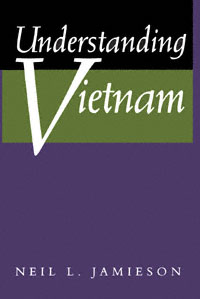 | Title: Understanding Vietnam Author: Jamieson, Neil L Published: University of California Press, 1995 Subjects: Anthropology | Politics | Cultural Anthropology | Asian History | Southeast Asia Publisher's Description: The American experience in Vietnam divided us as a nation and eroded our confidence in both the morality and the effectiveness of our foreign policy. Yet our understanding of this tragic episode remains superficial because, then and now, we have never grasped the passionate commitment with which the Vietnamese clung to and fought over their own competing visions of what Vietnam was and what it might become. To understand the war, we must understand the Vietnamese, their culture, and their ways of looking at the world. Neil L. Jamieson, after many years of living and working in Vietnam, has written the book that provides this understanding.Jamieson paints a portrait of twentieth-century Vietnam. Against the background of traditional Vietnamese culture, he takes us through the saga of modern Vietnamese history and Western involvement in the country, from the coming of the French in 1858 through the Vietnam War and its aftermath. Throughout his analysis, he allows the Vietnamese - both our friends and foes, and those who wished to be neither - to speak for themselves through poetry, fiction, essays, newspaper editorials and reports of interviews and personal experiences.By putting our old and partial perceptions into this new and broader context, Jamieson provides positive insights that may perhaps ease the lingering pain and doubt resulting from our involvement in Vietnam. As the United States and Vietnam appear poised to embark on a new phase in their relationship, Jamieson's book is particularly timely. [brief] Similar Items |
| 272. | 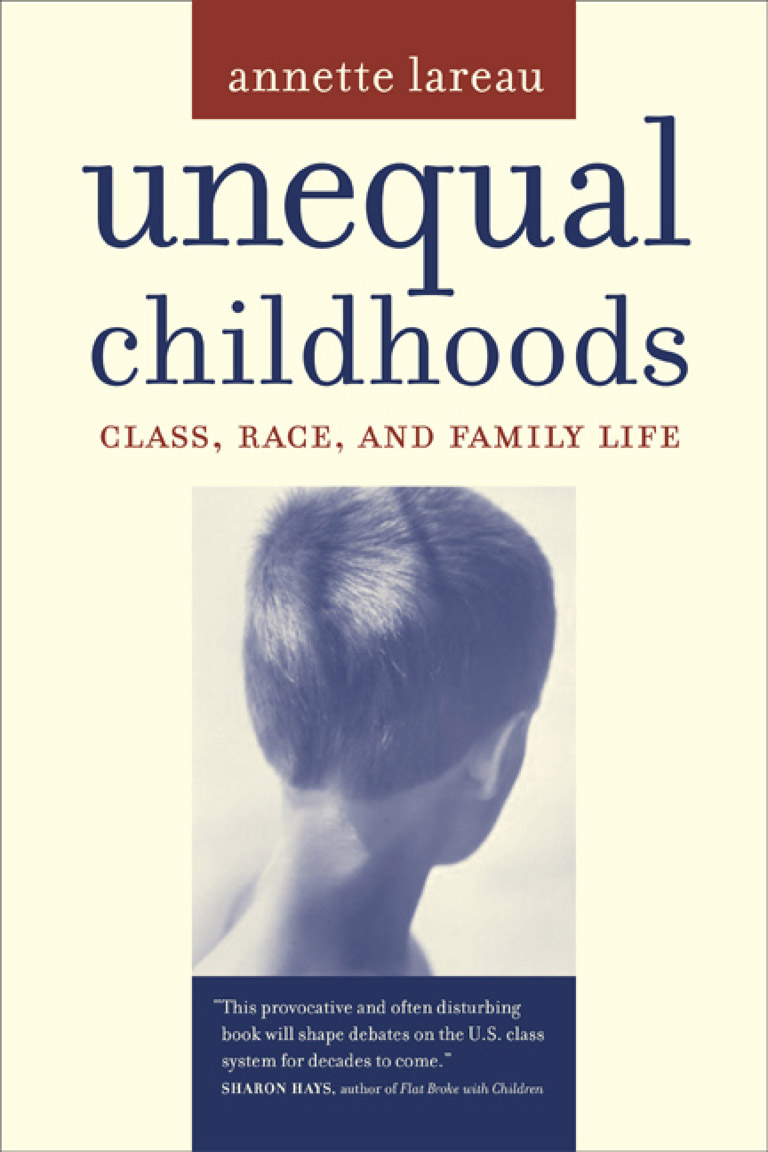 | Title: Unequal childhoods: class, race, and family life Author: Lareau, Annette Published: University of California Press, 2003 Subjects: Sociology | American Studies | Ethnic Studies | Anthropology | Education Publisher's Description: Class does make a difference in the lives and futures of American children. Drawing on in-depth observations of black and white middle-class, working-class, and poor families, Unequal Childhoods explores this fact, offering a picture of childhood today. Here are the frenetic families managing their children's hectic schedules of "leisure" activities; and here are families with plenty of time but little economic security. Lareau shows how middle-class parents, whether black or white, engage in a process of "concerted cultivation" designed to draw out children's talents and skills, while working-class and poor families rely on "the accomplishment of natural growth," in which a child's development unfolds spontaneously - as long as basic comfort, food, and shelter are provided. Each of these approaches to childrearing brings its own benefits and its own drawbacks. In identifying and analyzing differences between the two, Lareau demonstrates the power, and limits, of social class in shaping the lives of America's children. [brief] Similar Items |
| 273. | 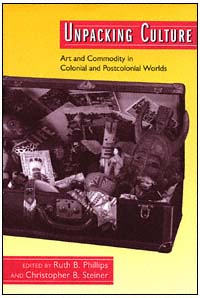 | Title: Unpacking culture: art and commodity in colonial and postcolonial worlds Author: Phillips, Ruth B. (Ruth Bliss) 1945- Published: University of California Press, 1999 Subjects: Anthropology | Social Science | Art History | Postcolonial Studies Publisher's Description: Tourist art production is a global phenomenon and is increasingly recognized as an important and authentic expression of indigenous visual traditions. These thoughtful, engaging essays provide a comparative perspective on the history, character, and impact of tourist art in colonized societies in three areas of the world: Africa, Oceania, and North America. Ranging broadly historically and geographically, Unpacking Culture is the first collection to bring together substantial case studies on this topic from around the world. [brief] Similar Items |
| 274. | 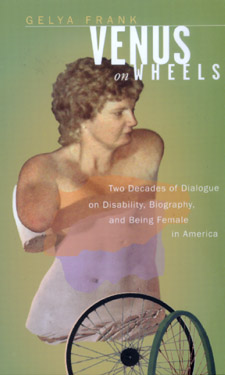 | Title: Venus on wheels: two decades of dialogue on disability, biography, and being female in America Author: Frank, Gelya 1948- Published: University of California Press, 2000 Subjects: Anthropology | Gender Studies | Sociology Publisher's Description: In 1976 Gelya Frank began writing about the life of Diane DeVries, a woman born with all the physical and mental equipment she would need to live in our society--except arms and legs. Frank was 28 years old, DeVries 26. This remarkable book--by turns moving, funny, and revelatory--records the relationship that developed between the women over the next twenty years. An empathic listener and participant in DeVries's life, and a scholar of the feminist and disability rights movements, Frank argues that Diane DeVries is a perfect example of an American woman coming of age in the second half of the twentieth century. By addressing the dynamics of power in ethnographic representation, Frank--anthropology's leading expert on life history and life story methods--lays the critical groundwork for a new genre, "cultural biography." Challenged to examine the cultural sources of her initial image of DeVries as limited and flawed, Frank discovers that DeVries is gutsy, buoyant, sexy--and definitely not a victim. While she analyzes the portrayal of women with disabilities in popular culture--from limbless circus performers to suicidal heroines on the TV news--Frank's encounters with DeVries lead her to come to terms with her own "invisible disabilities" motivating the study. Drawing on anthropology, philosophy, psychoanalysis, narrative theory, law, and the history of medicine, Venus on Wheels is an intellectual tour de force. [brief] Similar Items |
| 275. |  | Title: Violence workers: police torturers and murderers reconstruct Brazilian atrocities Author: Huggins, Martha Knisely 1944- Published: University of California Press, 2002 Subjects: Anthropology | Latin American Studies | Sociology Publisher's Description: Of the twenty-three Brazilian policemen interviewed in depth for this landmark study, fourteen were direct perpetrators of torture and murder during the three decades that included the 1964-1985 military regime. These "violence workers" and the other group of "atrocity facilitators" who had not, or claimed they had not, participated directly in the violence, help answer questions that haunt today's world: Why and how are ordinary men transformed into state torturers and murderers? How do atrocity perpetrators explain and justify their violence? What is the impact of their murderous deeds - on them, on their victims, and on society? What memories of their atrocities do they admit and which become public history? [brief] Similar Items |
| 276. | 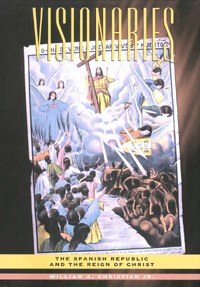 | Title: Visionaries: the Spanish Republic and the reign of Christ Author: Christian, William A 1944- Published: University of California Press, 1996 Subjects: Religion | Christianity | Popular Culture | Anthropology Publisher's Description: In June 1931, on a hillside in the Spanish Basque country, two children reported seeing the Virgin Mary. Within weeks, hundreds of seers were attracting tens of thousands of onlookers, and the nightly spectacle gave rise to others in dozens of towns across Spain. Visionaries explores the experience and the larger meaning of this wave.Immersing himself in the lives of the visionaries, William Christian retraced their steps and recreated their world. He spoke with hundreds of witnesses, who led him to caches of vision messages, diaries, clandestine publications, and eloquent photographs. He describes two kinds of visionaries and their relation to each other: the seers who had visions of Mary and the saints, and the believers who had a vision for the future, which they hoped Mary and the saints would confirm. Together, these visionaries attempted to convince a skeptical world that heavenly beings were appearing on the Iberian peninsula. By turns intense, poignant, fierce, and funny, this long-hidden history demonstrates the vital role of the extraordinary in giving voice to a society's hope and anguish. [brief] Similar Items |
| 277. | 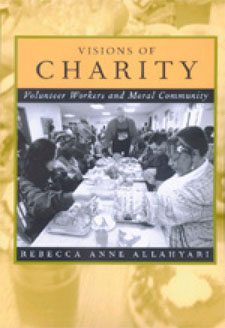 | Title: Visions of charity: volunteer workers and moral community Author: Allahyari, Rebecca Anne 1963- Published: University of California Press, 2000 Subjects: Sociology | American Studies | Anthropology | Ethnic Studies | Religion | Ethics | Gender Studies Publisher's Description: In the United States, public talk about charity for the poor is highly moralistic, even in our era of welfare reform. But how do we understand the actual experience of caring for the poor? This study looks at the front lines of volunteer involvement with the poor and homeless to assess what volunteer work means for those who do it. Rebecca Allahyari profiles volunteers at two charities - Loaves & Fishes and The Salvation Army - to show how they think about themselves and their work, providing new ways for discussing charity and morality. Allahyari explores these agencies' differing ideological orientations and the raced, classed, and gendered contexts they provide volunteers for doing charitable work. Drawing on participant observation, intensive interviewing, and content analysis of organizational publications, she looks in particular at the process of self-improvement for these volunteers. The competing visions of charity Allahyari finds at these two organizations reveal the complicated and contradictory politics of caring for the poor in the United States today. [brief] Similar Items |
| 278. | 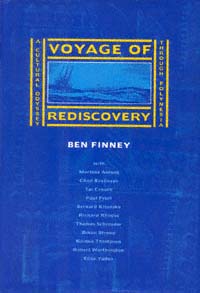 | Title: Voyage of rediscovery: a cultural odyssey through Polynesia Author: Finney, Ben R Published: University of California Press, 1994 Subjects: Anthropology | United States History | East Asia Other | Asian History Publisher's Description: In the summer of 1985, a mostly Hawaiian crew set out aboard Hokule'a, a reconstructed ancient double canoe, to demonstrate what skeptics had steadfastly denied: that their ancestors, sailing in such canoes and navigating solely by reading stars, ocean swells, and other natural signs, could intentionally have sailed across the Pacific, exploring the vast oceanic realm of Polynesia and discovering and settling all its inhabitable islands. Their round-trip odyssey from Hawai'i to Aotearoa (New Zealand), across 12,000 nautical miles, dramatically refuted all theories declaring that - because of their unseaworthy canoes and inaccurate navigational methods - the ancient Polynesians could only have been pushed accidentally to their islands by the vagaries of wind and current. Voyage of Rediscovery is a vivid, immensely readable account of this remarkable journey through the Pacific, including tales of a curiosity attack by sperm whales and the crew's welcome to Aotearoa by Maori tribesmen, who dubbed them their sixth tribe. It describes how Hawaiian navigator Nainoa Thompson guided the canoe over thousands of miles of open ocean without compass, sextant, charts, or any other navigational aids. In so doing, it documents the experimental voyaging approach, developed by Ben Finney, which has both transformed our ideas about Polynesian migration and voyaging and been embraced by present-day Polynesians as a way to experience and celebrate their rich ancestral heritage as premier seafarers.By sailing in the wake of their ancestors, the Hawaiians and other Polynesians who captained, navigated, and crewed Hokule'a made the journey described here a cultural as well as a scientific odyssey of exploration. [brief] Similar Items |
| 279. | 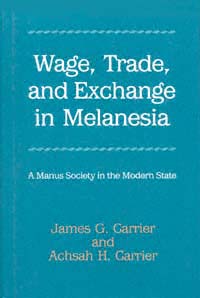 | Title: Wage, trade, and exchange in Melanesia: a Manus society in the modern state Author: Carrier, James G Published: University of California Press, 1989 Subjects: Anthropology Publisher's Description: Ponam Island, a small community in Manus Province, Papua New Guinea, is the subject of this innovative study. The authors extend the criticism within anthropology of ethnographies that attempt to analyze village communities without reference to the nations of which they are a part, and that equate the traditional and the exotic with the untouched. They do so by describing the links between a peripheral village society and Papua New Guinea's national economy and institutions, in a way that will interest all those concerned with development and underdevelopment.The analysis focuses on major socioeconomic areas of village life: education, migration, wage employment, and remittance; trade, commerce, and exchange; subsistence fishing; ceremonial exchange. The authors' findings challenge the idea that colonial and Western-oriented encroachment leads to the decay of village societies or to their adopting Western values and practices. Ponam has been under significant Western influence for almost a century, yet the society has not decayed. It remains flourishing and generative, uniquely itself and neither blindly traditional nor mindlessly Western. [brief] Similar Items |
| 280. |  | Title: Wagering the land: ritual, capital, and environmental degradation in the Cordillera of northern Luzon, 1900-1986 Author: Lewis, Martin W Published: University of California Press, 1991 Subjects: Geography | Anthropology | Asian Studies Similar Items |